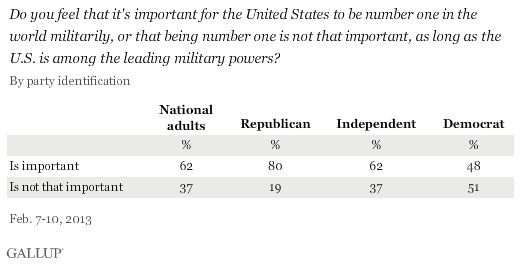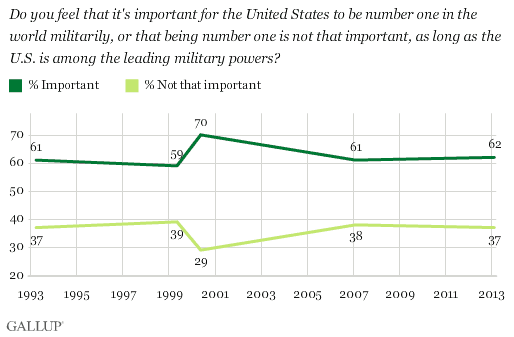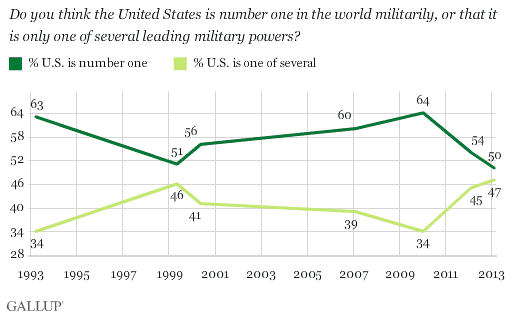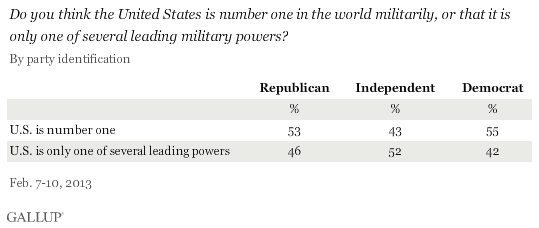PRINCETON, NJ -- Republicans (80%) are much more likely than Democrats (48%) to say it is important that the U.S. be No. 1 in the world militarily. Independents' views (62%) reflect Americans' views overall.

These attitudes, from Gallup's Feb. 7-10 World Affairs survey, are particularly relevant today given the looming sequestration cuts, which will require significant budget reductions in the nation's defense spending. One of the rationales behind the inclusion of defense spending cuts in the original sequestration legislation was that Republicans in Congress would be highly motivated to do something about the budget in order to avoid such cuts. These data directly support that rationale; rank-and-file Republicans are indeed much more concerned that the U.S. be No. 1 militarily than are rank-and-file Democrats.
Desire That the U.S. Be No. 1 Militarily Evident for Two Decades
A majority of Americans have said it is important for the U.S. to be No. 1 militarily each of the five times Gallup asked this question since 1993 -- ranging from 59% on the low end to 70% on the high end.

Fewer Americans Say U.S. Is No. 1 Military Power Than Say This Is Important
Americans are more likely to believe it is important that the U.S. be No. 1 militarily than to say the U.S. is in fact the No. 1 military power in the world. Exactly half of Americans now believe the U.S. is No. 1 militarily, essentially tying the low point -- 51% in 1999 -- in Gallup's trend, which dates to 1993.

The low point prior to the current February 2013 survey came in May 1999, when 51% said the U.S. was tops militarily. The high point for the view that the U.S. is the top military power in the world came in January 2010, when 64% held this view.
Republicans' and Democrats' views on this question differ little -- unlike the one asking about the importance of the nation being No. 1 militarily. Slightly more than half of each partisan group says the U.S. is No. 1. Independents' views bring down the national average, as 43% of them say the U.S. is the top military power.

Implications
The idea that major cuts in defense spending would upset Republicans -- which is one of the beliefs behind the original sequestration legislation nearly two years ago -- is reinforced by the results of Gallup's question asking Americans if it is important that the U.S. be No. 1 in the world militarily. Eight in 10 Republicans say "yes," while less than half of Democrats agree.
Additionally, just over half of Republicans now believe that the nation is still the top military power in the world. As recently as January 2010, 73% of Republicans said the U.S. was the No. 1 military power in the world. This would seemingly also support the idea that Republicans -- and Republican leaders -- would be concerned about the looming reductions in defense spending.
It is becoming increasingly evident, however, that the sequestration of defense (and domestic) spending will occur as scheduled on March 1 -- despite Republicans' worries about the nation's military standing in the world.
Survey Methods
Results for this Gallup poll are based on telephone interviews conducted Feb. 7-10, 2013, with a random sample of 1,015 adults, aged 18 and older, living in all 50 U.S. states and the District of Columbia.
For results based on the total sample of national adults, one can say with 95% confidence that the margin of sampling error is ±4 percentage points.
Interviews are conducted with respondents on landline telephones and cellular phones, with interviews conducted in Spanish for respondents who are primarily Spanish-speaking. Each sample of national adults includes a minimum quota of 50% cell phone respondents and 50% landline respondents, with additional minimum quotas by region. Landline telephone numbers are chosen at random among listed telephone numbers. Cell phones numbers are selected using random digit dial methods. Landline respondents are chosen at random within each household on the basis of which member had the most recent birthday.
Samples are weighted to correct for unequal selection probability, nonresponse, and double coverage of landline and cell users in the two sampling frames. They are also weighted to match the national demographics of gender, age, race, Hispanic ethnicity, education, region, population density, and phone status (cellphone only/landline only/both, cellphone mostly, and having an unlisted landline number). Demographic weighting targets are based on the March 2012 Current Population Survey figures for the aged 18 and older U.S. population. Phone status targets are based on the July-December 2011 National Health Interview Survey. Population density targets are based on the 2010 census. All reported margins of sampling error include the computed design effects for weighting.
In addition to sampling error, question wording and practical difficulties in conducting surveys can introduce error or bias into the findings of public opinion polls.
For more details on Gallup's polling methodology, visit www.gallup.com.
